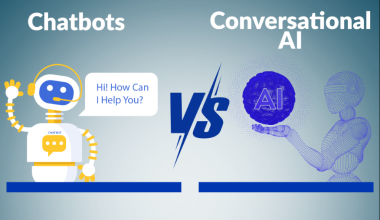From their ability to trim costs and enhance efficiency across industries to improving customer satisfaction, chatbots have become indispensable assets in today’s business landscape. Let’s learn about some of the ways chatbots can reduce your business costs!
Are Chatbots Really Cost Effective?
Chatbots have use cases in various industries, they have definitely revolutionized business operations! According to Juniper Research, businesses can save up to $8 billion annually through chatbot implementation. By automating customer inquiries, chatbots reduce the need for human customer service representatives, resulting in lower operational costs.
IBM also reports that businesses can save up to 30% in customer support costs by implementing chatbots. The adoption of chatbots spans various sectors. Above all, the cost per interaction handled by a chatbot is significantly lower than that handled by a human agent.
Reports suggest that a chatbot interaction can cost as little as $0.50 to $0.70, while the same interaction handled by a live agent can range from $4 to $15. The global chatbot market is expected to reach a value of $10.08 billion by 2026. This growth reflects the increasing adoption and recognition of the cost-saving benefits of chatbots across industries.
With all these facts in mind, we know that they are not going anywhere. While the setup costs for chatbots can vary based on complexity and customization requirements, their long-term cost-effectiveness in handling repetitive tasks makes them a valuable investment for businesses.
7 Ways Chatbots Can Reduce Business Costs
Here are 7 ways chatbots can reduce costs and save money for businesses around the world:
1) Operational Efficiency at Less Cost

Chatbots provide round-the-clock availability, that eliminates the constraints of human-centric schedules. You might need fewer human support agents which increases the efficiency. This is the best way chatbots can reduce business costs.
Bots only require setup and maintenance. They work tirelessly without requiring breaks, holidays, or overtime pay. This 24×7 availability caters to customer needs outside regular business hours also. Consequently, this operational efficiency leads to cost savings and enhances customer satisfaction.
2) Enhanced Accuracy by Reducing Errors
Chatbots might not handle complex queries that well (especially when they don’t have human emotions), but they can effectively answer all common simple customer questions. So, while human agents are required for detailed solutions, bots can work to do repetitive work. This also makes agent’s work more effective by focusing on difficult customers.
Bots operate based on pre-programmed algorithms and databases, ensuring consistent and accurate responses. This reliability in providing accurate information not only elevates customer satisfaction but also diminishes the need for extensive rework or correction, thereby cutting down operational costs associated with rectifying errors.
3) Data Collection and Analysis
Chatbots serve as invaluable tools for gathering and analyzing customer interaction data, which traditionally requires substantial resources and effort. You can get this data by other means, but if bots can also do it, it will definitely save costs for your business by doing two things at one time.
This data can be leveraged for refining marketing strategies, enhancing lead generation, and optimizing sales campaigns. Consequently, this insight aids in informed decision-making, allowing businesses to allocate resources more effectively.
4) Marketing Efficiency
AI-driven chatbots play a pivotal role in marketing campaigns by significantly cutting costs while enhancing engagement. These chatbots assist in lead nurturing through personalized content delivery and real-time responses to queries.
By engaging potential customers during the buying process, they reduce the necessity for additional customer support staff, thereby minimizing operational expenses.
5) Scalability Through Automation
Scalability is vital for business growth, and AI chatbots facilitate this by automating repetitive tasks, eliminating the need for an expanded workforce. Their ability to offer personalized support to customers and employees ensures that businesses can maintain exceptional service levels even as they scale up, without significantly increasing human resource expenses.
6) Sales Efficiency Improvement
AI chatbots streamline sales operations by handling routine tasks like lead qualification and appointment scheduling. This efficiency boost allows sales teams to focus on strategic activities like relationship-building with prospects and closing deals. The integration of artificial intelligence optimizes sales strategies, resulting in improved outcomes and reduced overall costs.
We already know that Chatbots can boost e-commerce conversion rates, that is the key thing to consider.
7) HR Function Optimization
Within human resources, AI chatbots streamline processes such as recruitment, onboarding, and employee engagement. By automating tasks like candidate screening and interview scheduling, these chatbots alleviate the burden on HR staff, leading to cost savings.
Moreover, they provide personalized support to employees, offering guidance on company policies and answering common HR-related queries, further enhancing operational efficiency within the HR department. ChatClient can help you make an AI chatbot for your business.
Other Key Benefits of Chatbots
Beyond the evident cost-saving advantages and operational enhancements, chatbots offer several other key benefits. They can seamlessly integrate with various communication channels such as websites, social media platforms, mobile apps, and messaging services.
With multilingual capabilities, they can communicate in multiple languages, breaking down language barriers and catering to diverse customer bases worldwide.
Also, with machine learning, chatbots continuously improve their performance. They learn from interactions, user feedback, and data analysis, thereby evolving to offer more accurate and relevant assistance over time.
Know The Limitations As Well
The limitations of chatbots are crucial to understand when considering their implementation in various contexts. Below are the limitations of chatbots you should know:
- Lack of Human Context Understanding: Chatbots struggle to understand nuanced human context, leading to potential misinterpretation of queries or customer needs, resulting in dissatisfied customers.
- Repetitive Responses: Many chatbots offer repetitive responses, providing the same answers for similar queries. This repetition can be easily identified by users, leading to frustration and a lack of engagement.
- Emotional Deficiency: Chatbots lack emotions and empathy, hindering their ability to build rapport or effectively handle emotionally charged situations, impacting the customer experience.
- Extensibility and Connectivity Constraints: Some chatbots may struggle to integrate with other systems or APIs, limiting their functionality and preventing them from providing comprehensive solutions.
- Data Regulation Compliance: Collecting personal data may lead to privacy concerns and legal ramifications if not handled in compliance with data protection regulations, such as GDPR, imposing fines and legal actions on non-compliant businesses.
You can avoid such chatbot mistakes to overcome these limitations.
Understanding these limitations is crucial for businesses or individuals intending to employ chatbots. Addressing these limitations may involve leveraging advanced AI technologies, investing in continual training and data enrichment, ensuring compliance with data regulations, and setting realistic expectations for the chatbot’s capabilities.
Takeaways
This blog unpacked the immense value chatbots bring to businesses and how they can reduce business costs. It delves into their role in reducing operational costs, enhancing efficiency through continuous availability, minimizing errors, facilitating data-driven decision-making, and improving engagement and scalability.





